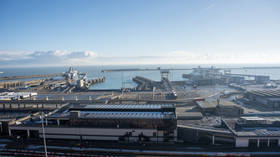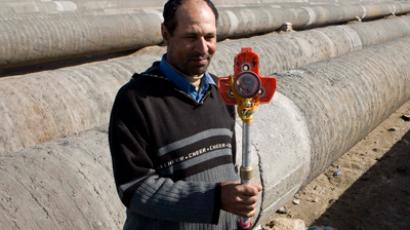Security breakdown in Sinai: Army battles it out with militants
Clashes in Egypt’s Sinai Peninsula are raging for the second day as the military attempts to combat militants who have taken a foothold in the region since Mubarak’s ouster.
The violence has spurred the largest military deployment in the Sinai Peninsula since 1979. Around 60 tanks, 15 armored personnel carriers, missile batteries and hundreds of soldiers have been sent into the main Northern Sinai town of Al-Arish on Thursday as Egyptian security forces continue to battle with Islamic militants.The deployment is believed to be the largest since Egypt signed the 1979 Camp David Accords with Israel. As a result of the accords, prior approval is needed before deploying troops on either side of the border, a condition which served to virtually demilitarize the Sinai Peninsula.Militants ramped up their attacks by attacking five joint military-police checkpoints on Wednesday, prompting the Egyptian military to launch airstrikes from Apache helicopters. Nile TV reported the airstrikes killed at least 20. It was the first time Egypt had deployed its air force in Sinai since the 1973 Yom Kippur War. The military also began sealing off some of the 1,200 illegal tunnels that currently permeate the Egyptian border with the Gaza Strip. The security operation was launched in response to a weekend attack when masked gunmen killed 16 Egyptian border guards before slipping across the border into Israel.On Thursday Egyptian Intelligence asked Hamas Prime Minister Ismail Haniyeh to hand over three members of the Izz ad-Din al-Qassam Brigades- Hamas paramilitary wing for providing indirect help to militants in Sinai, al-Quds newspaper reports.Mossad reportedly transferred a list of nine alleged militants connected with Sunday’s attack to Egyptian Intelligence on the same day. The nine suspected militants are said to be affiliated with "The Armies of Monotheism and Jihad in Palestine," reports Haaretz, citing Mousa Mohammed Abu Marzook, deputy chairman of the Hamas Political Bureau.Marzook maintained that Mossad was responsible for the attack, backing a claim that Egypt’s Muslim Brotherhood made earlier this week. The Muslim Brotherhood accused Mossad of “seeking to abort the [Egyptian] revolution since its inception.” Israel maintains Hammas are behind the attacks, an accusation they have denied.Egypt’s President Mohammed Morsi, who took the oath of office on June 30 to become the country’s first freely elected president, said those behind Sunday’s “cowardly” attack would pay dearly. Morsi, who is a longstanding member of the Muslim Brotherhood, has not publicly blamed Mossad for the assault.In a move to assert his authority, on Wednesday Morsi said he had forced his director of General Intelligence Services to resign and had dismissed the governor of Northern Sinai. As the military is constitutionally out of Morsi’s reach, Field Marshal Mohammed Tantawi, the head of Egypt’s Supreme Ruling Military Council, fired Hamdy Badeen, the head of Egypt’s Military Police.Egypt’s armed forces further called on locals and Bedouin tribes in Sinai to help security forces restore order in the region.The resolute response from both Morsi and the country’s military rulers shows Egypt’s authorities are taking the deteriorating security situation in the region seriously.Many analysts have attributed the growing Islamist presence in Sinai to the security vacuum resulting from former president Hosni Mubarak’s ouster last year.Despite the recent flare-up in the violence, the Egyptian military actually launched “Operation Eagle” in August 2011 to re-establish control in Sinai, a move which saw 2,500 Egyptian troops and 250 armored personnel carriers deployed to Sinai. With Mubarak’s security apparatus virtually disintegrating in January of last year, a tacit understanding between Israel and Egypt was reached regarding the need to bolster the latter’s military presence in the region, Ahram online reports.An Egypt-Israel gas pipeline was sabotaged almost a dozen times in under a year, while militants believed to be connected with Islamist groups carried out a series of attacks on Egyptian police stations and checkpoints.Egypt’s decision to send in reinforcements and intensify its clampdown follows a claim by Israel that Sunday’s brazen attack was a “wake-up call” for Egypt to get a grip on the threat of growing lawlessness on what is, in effect, a bridge between Asia and Africa.















